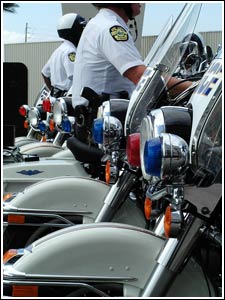The Police Subculture - Internal Sanctions, Solidarity, and Social Isolation
Because policing has long been a close-knit occupation, internal sanctions by peer groups have been the norm. Police officers graduating from the academy are expected to conform to the group norms of the department and even a particular district or precinct. These expectations are not written but passed on from the older officers to the younger officers by means of their actions or verbal instruction. Older officers may even test younger officers to see if they will conform to group norms by placing the younger officer in a situation and noting his/her manner of dealing with it. These are usually simple situations such as gratuity acceptance or some other minor infraction of department rules and regulations. The purpose is to see if the officer will go along with the group. If he or she does go along, the young officer is tested in greater forms of misbehavior. Failure to conform can bring much grief on the miscreant officer. Perhaps the greatest of all transgressions of group norms in policing is informing on another officer. This is true even in cases of serious criminal behavior. Most officers will do all they can to avoid being branded as an informer or stool pigeon because life in police, once that label is affixed, is all but intolerable.
Sanctions and adherence to peer group norms also engenders solidarity. Solidarity is also taught to young officers as a way of bringing them into the fold. Young officers are taught that the public is the enemy or more commonly, "assholes." Older officers will commonly say to those younger, "There are two kinds of people in this world: the police and the assholes." Such rhetoric is somewhat shocking to young officers, at first. However, after months of dealing with the social problems of society, many buy into the concept.
Most police officers do not work the traditional 8 to 5 schedule as most departments are of the few we-never-close organizations in city government. Two-thirds of the hours police officers are required to work puts them at odds with the average work-a-day world. They must work evenings and at night, not to mention weekends and holidays. Often young police officers gradually loose their circle of civilian friends, if for no other reason but their inability to socially connect. As such, this leaves only other police officers and police families as the available social connections. This can have negative consequences because police officers reinforce the police worldview, which is often skewed and cynical.

